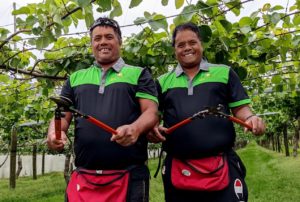Labour force gets boost
Brothers Robert and Radan Johnson at work in a Te Puke orchard.
Labour force gets a boost as more jobseekers take up orchard work
More job seekers are finding work in the kiwifruit industry with their efforts making a substantial contribution to addressing a dire labour shortage.
This year 2,250 people in the Bay of Plenty region swapped benefit assistance for seasonal work, an increase of more than 30 percent on the 2020 kiwifruit season.
It’s good news as the kiwifruit industry faces a challenging year ahead, with predictions of a 6,500 shortfall in the availability of seasonal labour for the 2022 harvest.
Hundreds of people have been assisted on their journey off the benefit and into employment through a partnership between the Ministry of Social Development (MSD), New Zealand Kiwifruit Growers Inc (NZKGI), local packhouses and kiwifruit employers.
Many people have gone on to land permanent jobs in the industry, while others have used the experience as a stepping-stone to full-time work in other sectors.
Brothers Robert and Radan Johnson are among a group who travel from Rotorua to undertake seasonal work.
The twins make the daily commute to Te Puke to work in local orchards. Their work ethic and dedication to the job has impressed kiwifruit contractor Lewis Ellis, who is delighted with the boost in manpower this partnership has brought.
“They work extremely well and are reliable and I’m pleased with the calibre of people we get. It’s a great testament to the arrangement we have with MSD,” he says.
But it’s not only orchard work where the pair have made their mark. They are responsible for picking up other Rotorua workers each morning, with one brother driving the minibus and the other ensuring everyone is on time and on board before they leave the city.
Robert enjoys working in the outdoors and picking up new skills, such as winter pruning. “The training you get is excellent and I’ve learned heaps of new things,” he says.
Radan says being with his brother all day in a work environment was a novel experience. “It’s the first time we have worked together. It’s really good and we get along well and enjoy each other’s company.”
Working alongside others was also fun, he says. “You get to meet new people and make friends. It’s a different experience every day and it’s enjoyable work. Good jobs are hard to find so we don’t mind coming over to Te Puke each day.”
Gavin Stagg, NZKGI’s labour co-ordinator, says there’s a misconception that working in the kiwifruit industry is poorly paid.
“We’ve had people who’ve joined the industry full time after having a taster of this work. Some have gone on to secure permanent roles that pay extremely well.”
For those who may have been on a benefit for a long time, the experience of working in the kiwifruit industry can help people regain their confidence and get them back into the workforce, he says. “Our employers are very supportive and help people reach their full potential.”
MSD may provide assistance for job seekers taking up seasonal work opportunities. NZKGI works with contractors to ensure training is provided so people are “work ready” for the tasks involved.
“It’s now common for employers to provide transport for people,” says Gavin. “There are also employers who pay for their employees to get their driver licence as they know that transport can be a barrier for some people.”
Bay of Plenty Regional Commissioner for Social Development, Mike Bryant, says helping people back into work remains a major focus.
“Through collaborating and working with other industry groups and employers we’ll collectively make a positive difference.
“Being able to travel to Te Puke and experience seasonal work has allowed these participants to understand the seasonal industry and the work involved. They were able to develop new skills and build confidence, so they were ready to take up new job opportunities as they arose.
“We enjoy working with employers who take a positive approach to supporting people into work and who are happy to consider barriers that new employees may face. This substantially increases the pool of people available and will be the long-term solution to employee shortages.
“We urge any employers who would like to discuss this partnership, or how we can support with their recruitment needs, to contact us.”

